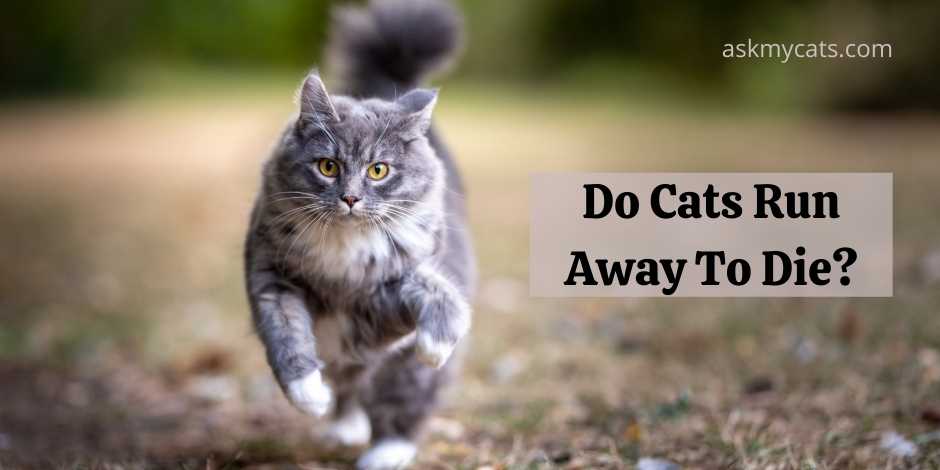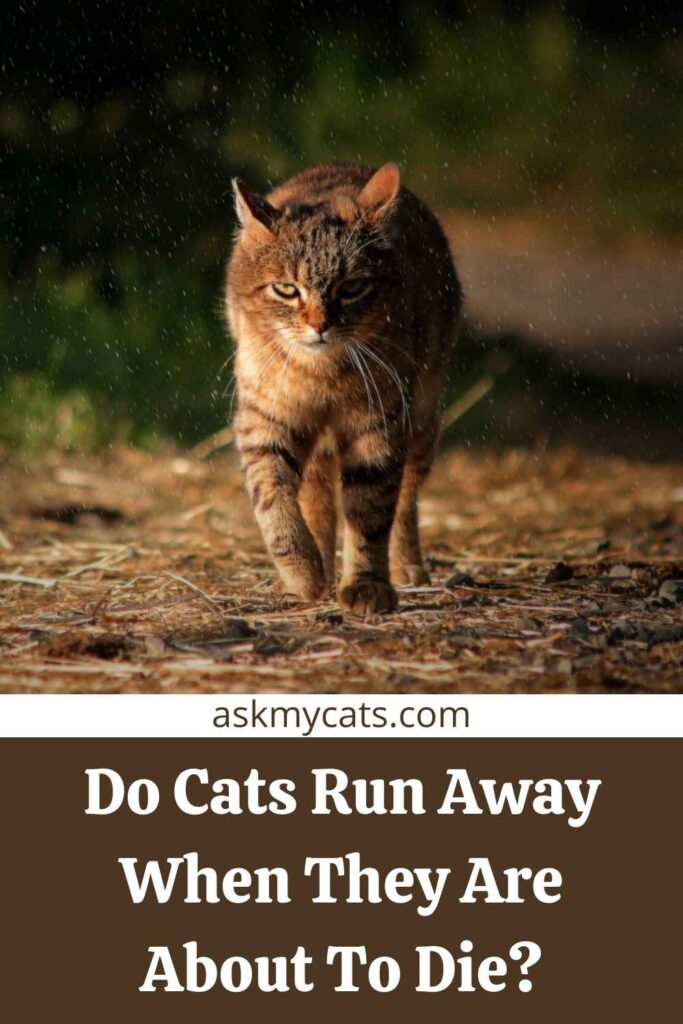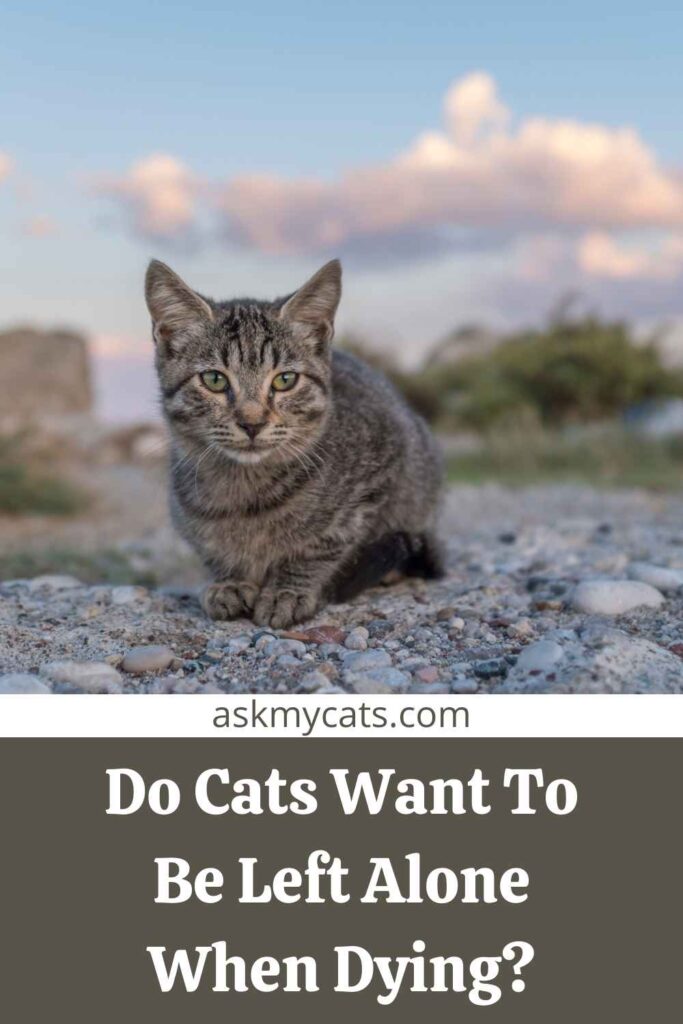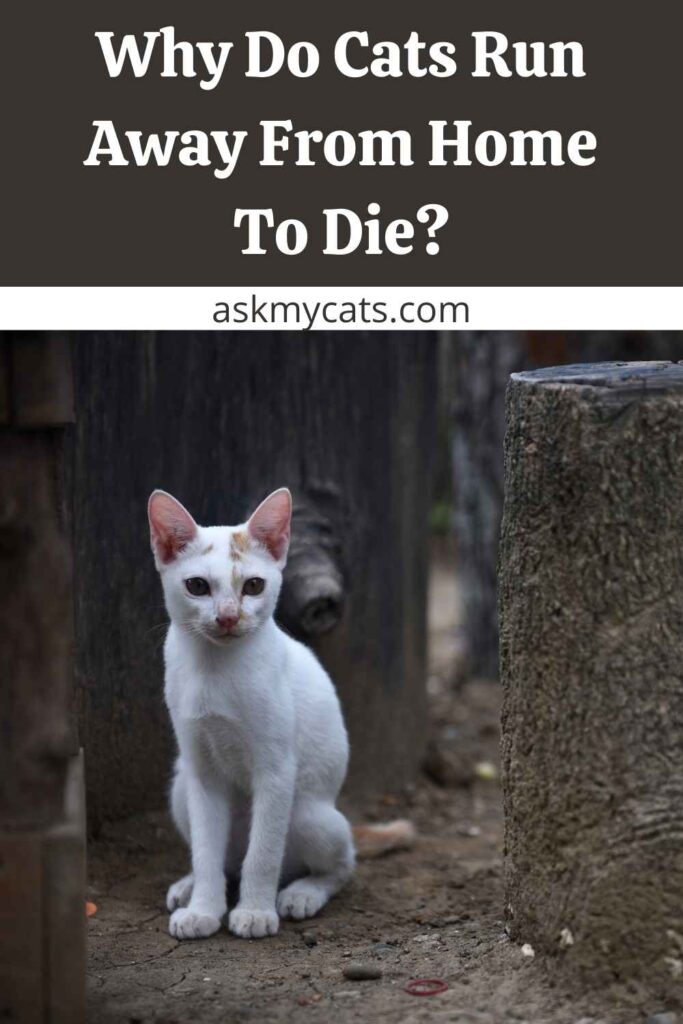Cats display a variety of behaviours related to illness and death that owners find difficult to comprehend. Do cats flee to die, or do they prefer to die in the arms of their adoring owners? Every ill animal’s death process is distinct.
When a cat realizes it is dying, it usually runs away to a remote location where no people or other animals are present.
There are numerous fascinating reasons why these creatures behave in this manner. This knowledge will assist you in preparing for the inevitable with your pet kitten.


Give Your Cat the Perfect Day
Get the Free Ebook!
Do Cats Run Away When They Are About To Die?
Cats run away to die and hide from predators because they understand they are weak and vulnerable to predation.

While cats dislike dying alone, they protect themselves from harm by keeping their illness hidden. They also do this to save energy and locate a pleasant, quiet location to relax.
Because cats lack the physical power to go great distances, they rarely hide far from home. Before death, however, not all cats sequester themselves. Some cats want to stay close to their owners, becoming more friendly and needy in the process.
Cats have a sixth sense and can detect things that humans cannot. They’re also more in tune with their physiology and have a greater sense of smell than we do.
Although there isn’t enough evidence to say if cats can feel when they’re about to die, they can recognize when they’re sick and weak. This means they’ll be able to tell when they need to hide from predators to be safe.
Cats are also wise to stimuli. If they start to stink because they’re unwell and unable to groom themselves, for example, they may probably feel something’s wrong.
Because cats are sentient beings, they experience pain. They may not realise they can die, but they know that something is wrong.
However, most veterinarians believe that it’s hard to tell whether cats are aware of their impending death.
There’s a lot of anecdotal evidence from pet owners who believe their pets knew when it was time to die, but it’s unclear if this is a coincidence or something more spiritual.
Do Cats Run Away When They Are Sick?
When cats are sick, they want to go somewhere distant, hidden, and quiet where they may rest and recover without being disturbed.
They may also determine that the best quiet location for them is not in your home.
Hopefully, your kitty will recover quickly and return home soon. But this isn’t always the case. Sick or wounded cats are especially vulnerable when left alone in the wild.
For example, they might contract feline flu or become an easy target for a local predator. If your cat is on the edge of passing away, it may go out in search of solitude and never return.
Do Outdoor Cats Leave Home To Die?
Yes, outdoor cats can leave home to die.
Although it appears that cats flee to die, this behaviour is because dying cats are often too ill or weak to defend themselves. This makes them vulnerable to predation by signalling to predators that they are easy prey.
While domesticated cats do not face the same issues, they have a hard-wired inclination to conceal to defend themselves. They are occasionally forced to leave their homes because of this necessity.
Cats do not leave their homes to die. When they’re sick, they’re compelled to seek out a place to heal or deal with their sickness without being surrounded by pressures.
To alleviate the agony, cats usually snuggle up and go to sleep, silently drifting away in the process. It isn’t pre-planned, although it appears to the bereaved owners.
Do Cats Want To Be Left Alone When Dying?
Yes, cats want to be left alone when they sense their death.

Cats hide for various reasons, and it’s seldom because they’re fleeing to die. On the other hand, isolation gives them the solitude and quiet they need to live out their dying days.
Because dying cats are frequently in pain or suffering, it’s only logical that they would wish to protect themselves from more agony. The following are the most typical causes of your cat’s isolation:
When cats are unwell, it’s natural and typical to isolate themselves. This does not imply that individuals flee their homes to die but rather that they hide to make themselves feel better.
Cats that live in noisy, bustling households are more inclined to separate themselves, although even mated cats do so.
Cats’ basic survival instincts keep them going while they’re nearing the end of their lives. Their motives for isolationism, which can be sad and perplexing, do not include preserving their owners’ feelings. Owners should ignore this since their pet is sick and wants to be alone.
Cats sequester themselves to preserve energy before they die. Some medical disorders, like failing organs or tumours, result in significant discomfort and weakness, preventing cats from moving very far. They can preserve the last amount of energy by isolating themselves somewhere safe and secure.
They’re unlikely to leave the location they’ve selected to isolate since the disease is generally so far advanced by this time.
They also refuse to eat, drink, or use the litter box, all of which are telltale symptoms that they’re dying.
Cats are sensitive to human emotions. According to Animal Cognition, researchers noticed that cats responded differently when their owners frowned or smiled.
This shows that cats can sense unpleasant emotions and are less likely to want to be with sad humans in their final days.
Similarly, if the cat is in agony and its owner strokes and pets it, the animal’s dying days will almost certainly be unpleasant. Being friendly demands a significant amount of effort, which dying cats lack. When they’re unwell, it’s a lot more convenient for them to conceal.
Why Do Cats Run Away From Home To Die?
Cats run away from home to die because they want to peacefully live their last few days.

While cats may want to die alone when they isolate themselves, most cats prefer to die among their loved ones. However, this is a complex problem with a multifaceted solution that depends on several elements.
As previously said, it’s reasonable to believe that cats aren’t always aware when they’re on the verge of dying. They’re merely hiding because they’re unwell and don’t want to be handled or fussed over as a result.
Because they are most vulnerable in their dying days and hours, they prefer to be alone where predators cannot harm them.
Cats’ instincts teach them to conceal when they sense something is amiss. This isn’t about you; it’s about evolution.
Another reason they choose to remain apart from you is that they’re hard-wired to keep their disease a secret. In the eyes of a cat, informing its owners that it is sick might put it in danger.
On the other hand, some cats grow friendlier as they approach death, preferring to be as close to their humans as possible. Whether or not this occurs entirely dependent on your pet’s personality and the cause of death.
Pet cats are loyal to their owners and build strong ties with them. When they are near death, though, their solitary instincts take over.
Where Do Cats Go To Die Outside?
Cats that are dying don’t usually move far.
They are too frail and vulnerable to survive a long journey and lack the energy to do it. Many cat owners discover that their kitties have died near their homes.
Most cats seek a cool or warm area away from potential risks (depending on the temperature). The most common hiding spots include:
- Under bushes
- Under vehicles
- Inside garages or sheds
- In dense woodland areas
- Inside boxes or other containers
- Within abandoned buildings
Some cats hide within their own homes, but they tuck themselves away so securely that they are impossible to locate. That’s why it might take a few days for owners to find their lost pet.
Frequently Asked Questions
Where do cats usually go to die?
Cats frequently seek out cool, shady spots, such as behind shrubs, thickets of wild grasses, or beneath automobiles. If your sick or elderly pet has suddenly vanished, start by looking in these places around your house. Indoor pets will behave in the same way, seeking cool, dark places to relax.
Do cats know when another cat is dying?
After the death of another cat, cats display behavioural changes that might be difficult to comprehend. While no one knows if cats comprehend death, they know that a housemate has gone missing and that something has changed in the household.
Do cats leave home when they are dying?
Many cats will euthanize themselves; learn why cats do this. Although the exact reason why some cats wander away to die is unknown, it’s possible that as our cats are old and sick, they prefer to be alone and relax.
Final Words
While not all cats flee when they know the end is approaching, some do. Some cats are most likely fleeing to die because they desire a tranquil spot to rest before passing away. It’s also conceivable that your cat is trying to spare you the agony of watching it die.
Ask your questions in the comments section below.
